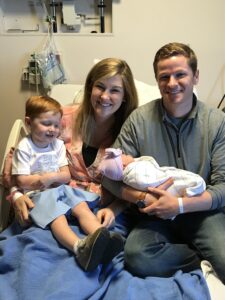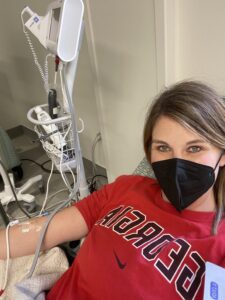Bonnie Willi’s Vasculitis Journey Began Postpartum
While having a new baby can be a joyful event, the effects on a woman’s body can be difficult to deal with and it takes time to heal. Bonnie Willi knew what to expect when she had her son in March 2015, but after his birth, rather than mend as she expected, her health began to decline.

“I had a wound that wouldn’t heal for eight months, and my OB-GYN repeatedly dismissed it,” she recalled.
Compounding her concerns were persistent sinus and ear infections, along with a relentless cough. Doctors attributed all of her symptoms to illnesses brought home by her infant who was in daycare. By January 2016, Bonnie’s condition worsened. She suffered random swelling and migrating pain. When she couldn’t walk, she visited an emergency room in Atlanta, but was sent home after an x-ray revealed no issues. Bonnie was directed to her primary care physician, who ran tests, but the results came back within normal range.
“I began seeing a rheumatologist for an ‘unnamed autoimmune condition’ and started medications such as low dose prednisone and Plaquenil® that weren’t really having any impact,” said Bonnie, who works in human resources for a manufacturing company.
When she started coughing up blood while visiting family in 2016, she ended up in the emergency room in Columbus, Ohio. Brian Zeno, MD, a pulmonologist at the hospital, recognized the pattern of her symptoms and suspected GPA. Dr. Zeno performed a bronchoscopy that confirmed the diagnosis.
A Treatment Plan
Bonnie had a brief stay in the ICU and was referred to a rheumatologist who put her on the right treatment plan. More than a year after her symptoms began, she finally had some answers. High dose steroids provided immediate relief and prevented potential organ damage. Bonnie is grateful for Dr. Zeno’s decisive action and the ongoing care she now receives from her Atlanta-based medical team at Emory University Hospital.

Brett, Bonnie’s husband of 13 years, has been by her side through it all.
“Brett has been my champion throughout the past 10 years since my symptoms began,” she shared. “It’s an adjustment knowing I’m not always at my best, and we both still have some bad memories of my initial diagnosis and ICU stay, which can be hard to relive sometimes.”
The couple discusses mortality more frequently than most their age.
“As a whole, I would say my diagnosis has made us stronger as a couple and we have been through so much. We know we are on a solid foundation.”
Before her diagnosis, Bonnie, now 38, had little knowledge of GPA. This rare form of vasculitis typically affects the sinuses, lungs, and kidneys but can involve any organ. GPA can worsen rapidly, so early diagnosis and treatment are essential to prevent organ damage or failure.
Bonnie has been on prednisone since her diagnosis. She took Rituxan® for three years, but it weakened her immune system, so she switched to methotrexate, which she is currently taking.
“I started Hizentra® immune globulin infusions in 2019, which have really helped my immune system after the damage Rituxan caused,” Bonnie said. “I also do sinus rinses and have to take antibiotics when I get hit with infections.”
While these medications help maintain her remission, they also cause fatigue and require careful management.
“Balancing all of this while working and being a mom of two can be challenging but worth it,” she said. “I’m grateful for science and medicine because I am in remission!”
Contributing to Research

Despite ongoing challenges, Bonnie remains optimistic and deeply committed to helping others on a similar path. She advocates for earlier GPA diagnosis, participating in numerous research studies through the Vasculitis Foundation and Sanguine BioSciences. These studies, focusing on root causes and treatment responses, often require only a simple blood draw.
“I hope to help find a cure or at least identify the causes of GPA to prevent others from going through the long wait for a diagnosis like I did,” she said.
For those living with vasculitis, Bonnie stresses the importance of proactive self-advocacy.
“I have a wonderful team of doctors, but I also speak up for myself when needed, and I encourage everyone to do the same,” she said.
Beyond this, Bonnie believes in staying positive but acknowledges that it’s okay to feel frustrated and sad at times. She draws strength from the Bible verse Joshua 1:9, which reminds her to be strong and courageous. Her life motto is, “this too shall pass,” and alongside the comforting strength of her faith, Bonnie is reminded that no one is ever truly alone, even in the hardest times.
Participating in the search for answers and a cure allows Bonnie to focus on the future, rather than dwelling on the past.
“I’m grateful for the connection to others and our strength is better together.”
